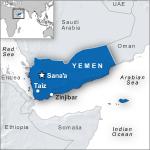Over three thousand Ethiopian migrants – who risked their lives leaving the Horn of Africa – find themselves stranded in Yemen, near the Saudi Arabian border. The migrants want to return home, but the International Organization for Migration said it has no money to evacuate them.
Lives at risk
The trip to Yemen is perilous. Migrants often hire smugglers to take them across the Gulf of Aden or Red Sea. Every year, many die at the hands of the smugglers or are robbed and left with nothing. Those who survive the traffickers or make the long journey to northern Yemen are usually hungry, exhausted or sick.
Nevertheless, many have managed to reach Yemen. The IOM says there are about 70,000 Ethiopian migrants who live in Yemen doing domestic work or employed on Khat plantations.
But while many decide to remain in Yemen, large numbers want to go to Saudi Arabia. Among them are the 3,000 migrants now stranded at the Saudi border.
"The ultimate goal of most of them is to actually go through and earn themselves a job in Saudi. Unfortunately, visas to Saudi are very restrictive and so most of them try getting across by irregular means and through traffickers," Nicoletta Giordano is the IOM Chief of Mission in Yemen.
The traffickers often abuse the migrants in the same way smugglers did in crossing the Gulf of Aden and Red Sea.
"The Saudi border has been perhaps more porous in the past, but with the current instability in Yemen the Saudis have certainly tightened up their controls. And so that's why there's a huge surge at the border and at this border town Haradh, which is smack in the middle of the desert with quite extreme weather conditions. And the migrants are among a number of vulnerable groups already hosted in Haradh and the surrounding area," she said.
No visa, no entry
Most of those who do make it across the Saudi Arabian border are forced to return to Yemen.
"We come across desperate cases of people who've been returned to Yemen under duress. And who have most probably undergone quite strenuous circumstances in order to get across to Saudi," she said.
The Ethiopian government is doing what it can to assist the migrants and has asked the international Organization for migration for help. Since last year, IOM has evacuated about 5,000 so-called irregular Ethiopian migrants. But now, it's out of money. It's asking donors for $2.5 million so it can resume the evacuations of the Ethiopian migrants.
